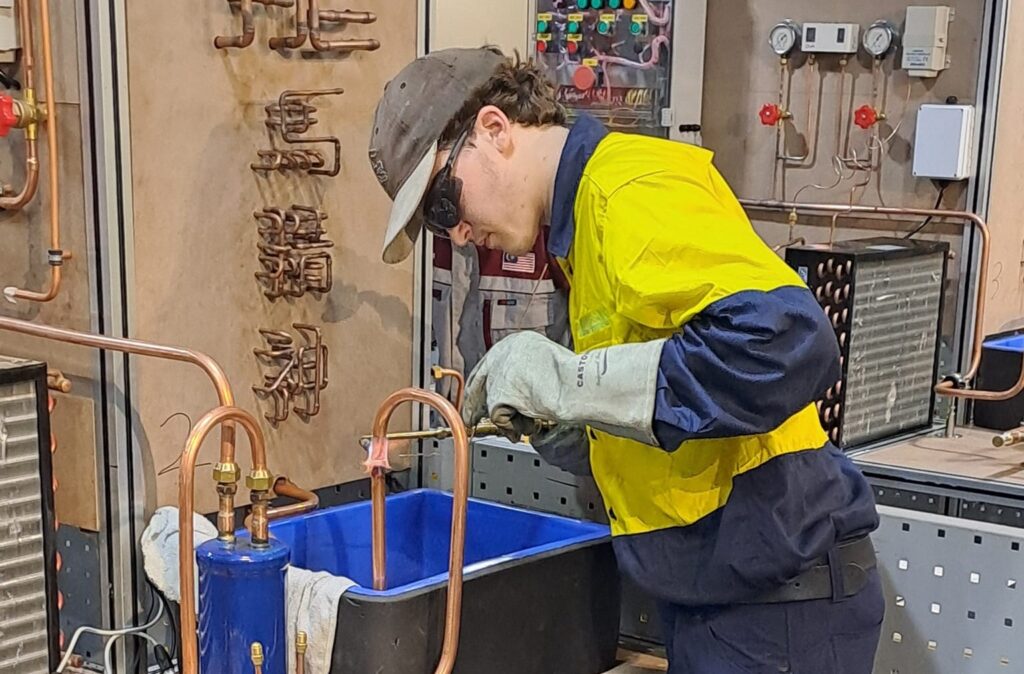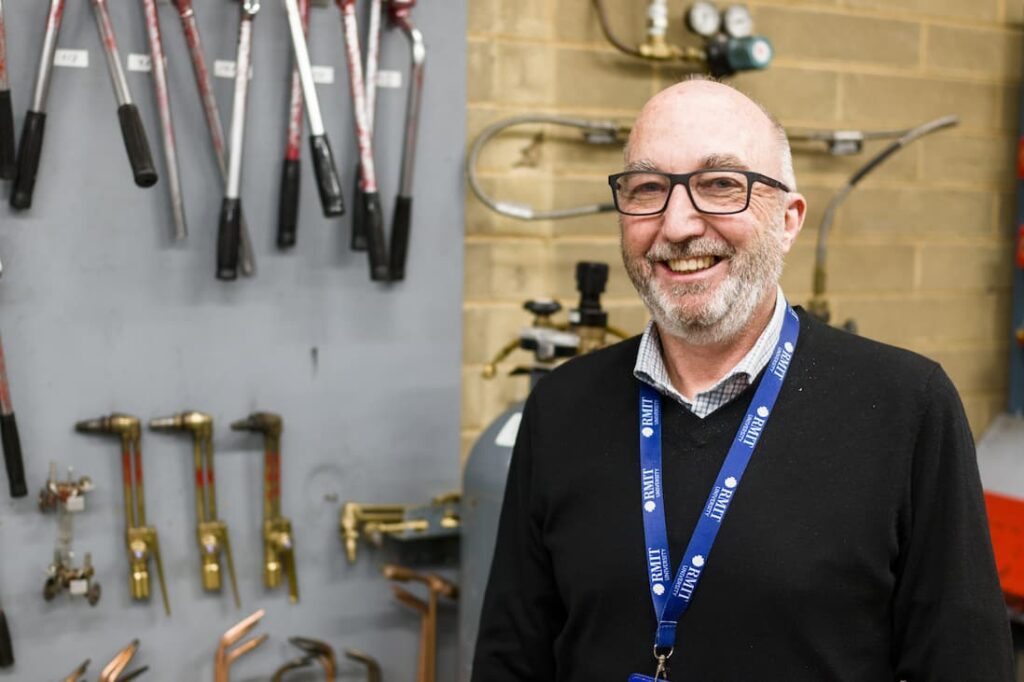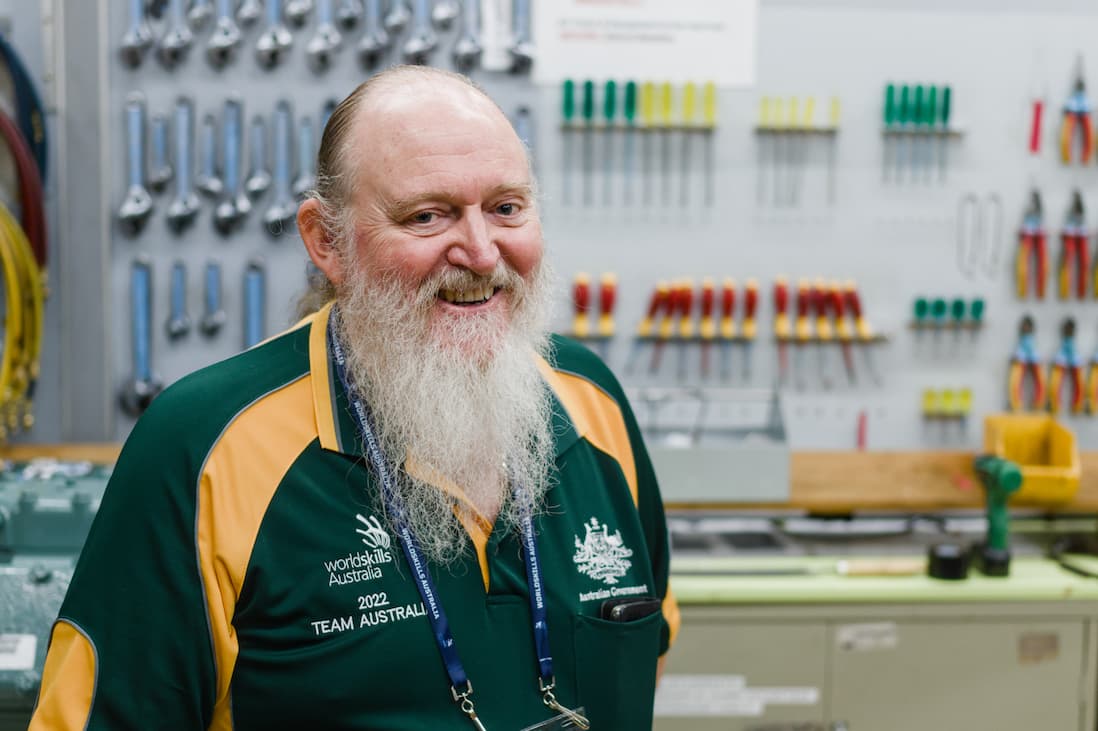We peek into the highly competitive “Olympics of HVAC&R skills” to see how the Australian team is preparing for WorldSkills Lyon in September.
Carl Balke, Affil.AIRAH, is synonymous with WorldSkills Australia. A tall man sporting a trademark Ned Kelly beard, Balke has been a key figure in ensuring Australia’s participants are thoroughly prepared for the demanding test of refrigeration and air conditioning skills that takes place at the international gathering.
After four decades in the industry, including 35 years working for TAFE Queensland and nearly as much time volunteering with WorldSkills Australia, the legendary HVAC&R educator has received one of the industry’s greatest accolades: being inducted into the ARBS Hall of Fame.
When he was first hired to work at TAFE Queensland, Balke was told he got the job because of his “nuts and bolts” approach. At the time, he took that as an insult to his intelligence. Now he realises that it was actually a compliment; his practical nous and down-to-earth style have endeared him to several generations of students. Nevertheless, he still believes that analytical thinking is crucial for working in HVAC&R.
“For air conditioning and refrigeration, you need to have those higher-order cognitive skills,” Balke says, pointing out that this requirement distinguishes it from many other trades.
“There’s a huge gap between a certificate III in HVAC&R and a certificate III in painting, decorating, and wallpapering, for example,” he says. “As much as that is a skill and I can’t do it, it really is poles apart from what we do.”
When scouting for potential representatives for Australia’s WorldSkills team, Balke looks out for young fridgies who have both hands-on aptitude and strong cognitive skills.
Tough competition
If you’ve never taken part in WorldSkills or attended a competition, you might be surprised to learn just how big a deal it is globally. The organisation began in Europe after World War II as a means of encouraging young people to learn a trade to improve both their own living standards and the standards of society in general. The first competition was held way back in 1950 in Madrid.
Nowadays, WorldSkills operates on a two-year cycle, with 88 member nations competing at global events across a wide range of categories. This year’s general assembly will take place in Lyon, France, in September.
The competition is rigorous, with judges evaluating around 260 aspects of participants’ work and giving marks ranging from zero to three for each category.
“It’s very strongly validated so that it’s fair,” Balke says. “That’s the key.”
Balke has been busy preparing Australia’s HVAC&R competitor, Queensland-based fridgie Bailey Loenneker, Stud.AIRAH, for the competition. Loenneker took part in a WorldSkills competition in China earlier this year, before travelling to RMIT in Melbourne for another warm-up event – featuring competitors from China, Brazil, Austria, and New Zealand – in May.
Balke says these experiences have been invaluable not just for Loenneker’s preparation for Lyon, but for his development as a tradesperson.
“He learnt so much from being a competitor, as all the competitors do,” Balke says. “How much they get out of it depends on their own personal journey.”

Although Balke works hard to give Australia’s representatives the best possible preparation, the nature of working apprenticeships means there’s only so much one-on-one time for training.
“We do it on a cycle of two years and we get six months to train them, but they’re working full-time and training part-time on the weekends or after hours,” Balke says. “It’s difficult in our industry to take someone who’s working 40 hours a week and get them to lift to that next level.”
Australia’s training regime is intense, but it’s nothing compared to some other countries. Balke says some of Loenneker’s competitors will have trained full-time for six years just for WorldSkills, a luxury that someone working in the field simply doesn’t have.
Growth mindset
Though results are important, Balke says personal development is the real aim of the game.
“Wherever Bailey finishes, I want to see the quality of his workmanship, then I’ll know how much he’s improved,” he says. “It’s only such a short time from China, but I’ll be able to see whether the mindset has changed.”
In the months he’s been training Loenneker, Balke has already noticed a change in the young man’s confidence.
“I rang Bailey’s employer when we got back from China and told them that he had learnt a lot from the competition,” Balke says. “Without me asking, they told me that they’ve noticed a difference. He’s more intent, more focused. He’s got more buzz about him, and he talks more.”
For Balke, this is a common trajectory. He looks back at Patrick Brennan, Australia’s fridgie representative from WorldSkills Kazan in 2019, and his development since the competition, where he won a bronze medal in a tough field of 28 competitors.
“If you ask any of his family or friends, he’s a different person,” Balke says of Brennan. “He’s more outgoing now, more engaging.
“He gets frustrated now with the quality of tradespeople coming into his business because he’s got to train them.”
Brennan has remained loyal to his company since winning the medal and has given back to WorldSkills by helping to train and mentor the next waves of young talent coming through the ranks. Balke applauds his commitment and points out that, while some competitors want to “take on the world” after their WorldSkills experience, others prefer to perfect their craft at home.
“Everyone has a personal journey that they want to take,” he says. “If you want to stay in town, there’s nothing wrong with that. If you want to take on the world, there’s nothing wrong with that either.
“Whatever you want to do, you’ll have the confidence to do it.”
Growing the trade
David King is Program Manager – Air Conditioning and Refrigeration at RMIT. Having moved into the sector from a background in construction, King says the sheer knowledge and skill required to work in HVAC&R is grossly underestimated by the education system.
“I want to highlight that aspect of really high-quality skills,” King says. Throughout education, people look at certificate III as ‘just a trade’. We’re trying to change that and get rid of the level.
“The intricacy and knowledge involved in HVAC&R is enormous. My advanced diploma in building and construction wouldn’t get anywhere near what HVAC&R requires. Even as an industry, we’re miles apart.”

King points out that the difficulty of the course, combined with licensing requirements that don’t necessarily recognise prior learning appropriately or translate across state boundaries, can put people off.
“You want to know why we’ve got such a high dropout rate at the level of certificate IV? Because nobody wants to go out and get six different licences,” King says.
“We missed the opportunity to have a national occupational licence some years ago, so now we’ve got the states handling licensing.”
Starting young
Both Balke and King agree that, to address the worsening skills shortage in Australia, getting potential fridgies interested in the trade early on is key. They identify high school as the place to start.
“We need to have events where we engage with the young people,” Balke says.
“We should be targeting year 10s and 11s to take on an apprenticeship and start their trade journey earlier, not wait until they finish year 12 when they get distracted by all the shiny things.”
King points out that, while there are programs that cater specifically to school students, they’re not as widespread or well-supported as they could be.
“Even today we’ve got school-based apprenticeships,” he says. “They’re probably the most under-utilised apprenticeships we run.
“In plumbing, for instance, we’ve done school-based apprenticeships that have worked really well. If you run it correctly, they go to school three days a week, work with an employer one day a week, and come to TAFE on the other day.
“At the end of it, that comes off their apprenticeship. Whereas if you do a certificate II, the amount of credit you get is next to nothing.”
The passion of educators like Balke and King is evident. Helping them train the next generation of HVAC&R professionals – both for WorldSkills and for everyday working life – will require new levels of investment, strategy, and innovation.
 Nick Johns-Wickberg
Nick Johns-Wickberg


Leave a Reply